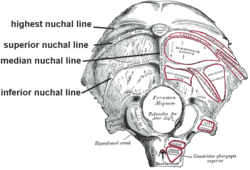Nuchal lines
Appearance
(Redirected from Linea nuchalis superior)
| Nuchal lines | |
|---|---|
 Occipital bone. Outer surface. | |
 Side view of head, showing surface relations of bones. (Superior and median lines visible at bottom right.) | |
| Details | |
| Identifiers | |
| Latin | linea nuchae |
| Anatomical terms of bone | |
The nuchal lines are four curved lines on the external surface of the occipital bone:
- The upper, often faintly marked, is named the highest nuchal line, but is sometimes referred to as the Mempin line or linea suprema, and it attaches to the epicranial aponeurosis.
- Below the highest nuchal line is the superior nuchal line. To it is attached, the splenius capitis muscle, the trapezius muscle,[1] and the occipitalis.[2]
- From the external occipital protuberance a ridge or crest, the external occipital crest also called the median nuchal line, often faintly marked, descends to the foramen magnum, and affords attachment to the nuchal ligament.
- Running from the middle of this line is the inferior nuchal line. Attached are the obliquus capitis superior muscle, rectus capitis posterior major muscle, and rectus capitis posterior minor muscle.
Additional images
[edit]-
Posterior view of superior nuchal line (labeled in red) and muscles connecting to it.
References
[edit]![]() This article incorporates text in the public domain from page 130 of the 20th edition of Gray's Anatomy (1918)
This article incorporates text in the public domain from page 130 of the 20th edition of Gray's Anatomy (1918)
- ^ Rea, Paul (2016-01-01), Rea, Paul (ed.), "Chapter 3 - Neck", Essential Clinically Applied Anatomy of the Peripheral Nervous System in the Head and Neck, Academic Press, pp. 131–183, doi:10.1016/b978-0-12-803633-4.00003-x, ISBN 978-0-12-803633-4, retrieved 2020-11-02
- ^ Casteleyn, Christophe; Bakker, Jaco (2019-01-01), Marini, Robert; Wachtman, Lynn; Tardif, Suzette; Mansfield, Keith (eds.), "Chapter 2 - The Anatomy of the Common Marmoset", The Common Marmoset in Captivity and Biomedical Research, American College of Laboratory Animal Medicine, Academic Press, pp. 17–41, doi:10.1016/b978-0-12-811829-0.00002-9, ISBN 978-0-12-811829-0, S2CID 92754272, retrieved 2020-11-02
External links
[edit]Wikimedia Commons has media related to Nuchal lines.
- "Anatomy diagram: 34257.000-1". Roche Lexicon - illustrated navigator. Elsevier. Archived from the original on 2012-07-22.

